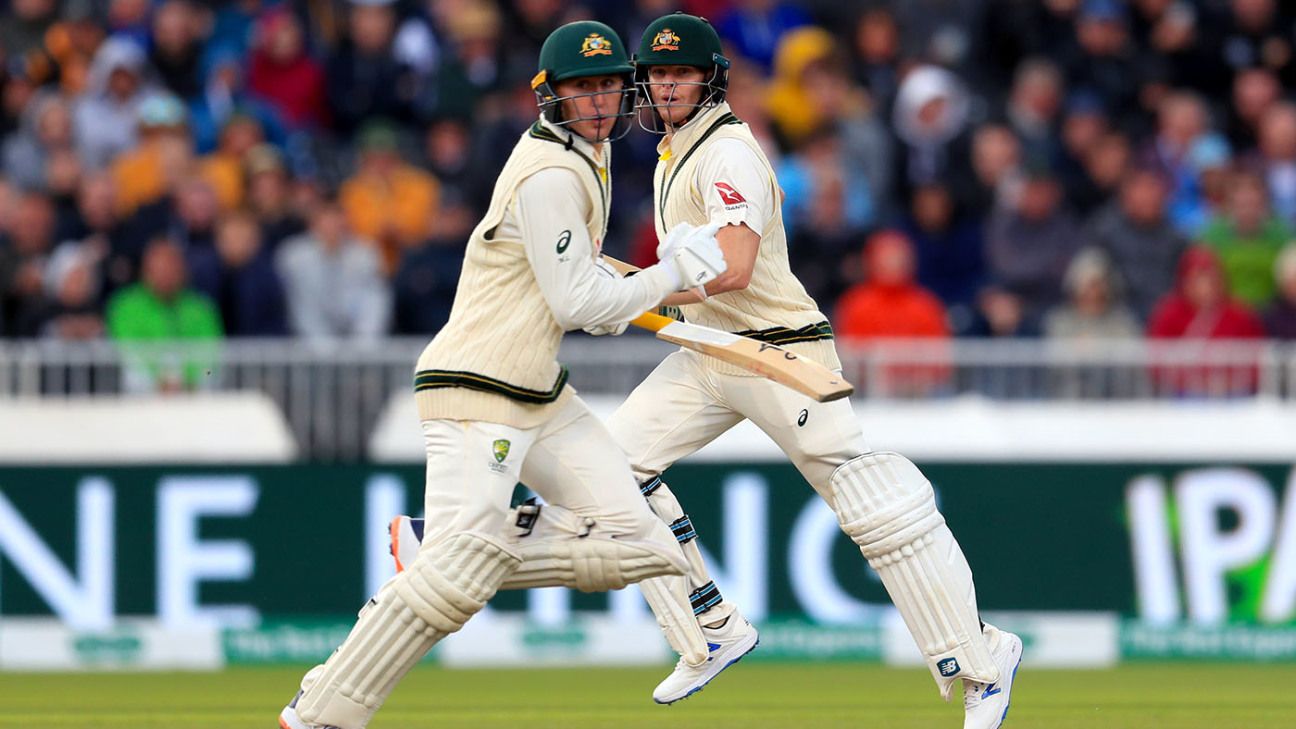
First, there was Steven Smith. At Edgbaston and Lord's, through three consecutive innings after his return from the Newlands scandal ban, he drove England's bowlers to distraction. They tried all manner of plans, filed placings lines, too many really, without much at all in the way of success. Two centuries went by and a third beckoned, even as Jofra Archer cranked up his pace on an up-and-down pitch, angling the ball back down the slope.
Watching, waiting, anticipating and perhaps dreaming a little, was Marnus Labuschagne. No-one in the Australian squad more closely resembled Smith's voracious pursuit of batting knowledge, skill and method, with both as likely as each other to keep teammates awake in the middle of the night with the sound of their bats tapping on hotel room carpet, miming shots for the next day. Labuschagne was watching closely when Archer homed in on Smith, felt the jolt alongside 28,000 spectators, and rushed for a vantage point to see if he was ok.
Struck down but not out, Smith returned briefly, distractedly, having passed concussion tests in the immediate aftermath of the blow. He did not fare as well the following morning, and as he netted in reserve on the Nursery Ground ahead of the final day's play, Labuschagne was given the word from the captain, Tim Paine: he was in as Smith's substitute. Having removed one obstacle, England found another immediately. Labuschagne, too, was hit by Archer, but only on the helmet grille. His resultant half-century scrounged a draw.
More was to come at Headingley, in two innings from Smith's customary post at No. 4. Thrice Labuschagne passed 50, runs that could have, indeed should have, been enough to secure an Australian victory at Leeds and retained the Ashes there and then. If he was the beneficiary of several dropped chances in a second innings of 80, his first-day contribution of 74 out of 179, when conditions were at their hardest, more than compensated for this good fortune. At the end, cruelly, one of Ben Stokes' match-winning sixes floated a matter of centimetres beyond Labuschagne's hands on the boundary.
Watching it all was Smith, leavening his pain at the result with appreciation of its extraordinary circumstances. Each day of the Leeds Test he gradually increased his level of activity, batting under the studied eye of the team doctor Richard Saw, before facing pace bowlers and taking part in a tour match against Derbyshire. Throughout, he tried to get used to the addition of a protective stem guard to the back of his helmet, even though it wade him so claustrophobic as to feel as though his head was inside an MRI machine. Nets against throwdowns were deemed, subconsciously, as more useful preparation than match batting against Derbyshire spin.
In Derby, Smith and Labuschagne played together and did not bat together, but they did not have long to wait. Chosen and Nos. 3 and 4, displacing Usman Khawaja, they trained together pre-match, Smith sidearming balls down at Labuschagne, who also enjoyed the rare sensation of having Steve Waugh clean mud out of his spikes. "A bit surreal, I had Steve Smith throwing sidearms to me for 30 minutes," he said. "I love talking to him about the game and learning off him, obviously a great experience and a great player. I'm taking it all in as much as I can."
For all the shuffling of Australia's top order to try to secure a better start, none could be found at Manchester. Again, the openers were separated before the score was into double figures, David Warner edging Stuart Broad when trying to leave him alone for the second time in the series. Marcus Harris, looking a little more comfortable, was nonetheless figured out pretty quickly by Broad, who quite obviously targeted the line of the stumps and won an lbw verdict before the score had reached 30.
Also read: The key to Broad's edge over Warner
Labuschagne had looked comfortable once more from the moment he arrived, leaving the length ball well outside off stump and scoring from anything that drifted either full and wide or too straight onto his stumps and pads. He had spoken before the series of sculpting a game very much around making lots of adjustments within lots of plans for every bowler in every set of conditions, eschewing the time-honoured Australian line of "playing my natural game" for something more scientific.
Smith, of course, had rather pioneered this method among contemporary Australian batsmen, keeping at least one step ahead of the world's bowlers for most of the last six years. Together, they were a hive mind of ideas, adjustments and tweaks, all done within the context of a moving ball and an English pitch. They have one inbuilt advantage, that of being right-handed and so denying Broad and Archer the chance to bend the ball away from them from around the wicket in the manner Warner, Harris and Khawaja have had to contend with, but the rest is skill and forethought.
Perhaps the most obvious counter offered up by Smith was in how he played Archer's bouncers, choosing to ensure he took evasive action to the off side of the ball, to eradicate the chance of him being hit by a delivery that follows him as he tries to sway back away from it. If the Old Trafford pitch was not yet a speedy one, and Archer was somewhat short of his best, the bouncer caused Smith zero trouble at all, leaving Joe Root and company with yet more thinking to do. At the other end, Labuschagne could only admire it.
"One thing he's very good at [is problem solving], I see that at the other end but I think you can see that as a spectator," he said. "When different guys come on, how he changes, different guards, the way he bats, different pre-movements and I think that's what makes him the best in the world. He's always one step ahead and thinking ahead, not waiting, not being reactive, he's being proactive, which makes him very hard to bowl to because he's always thinking ahead.
"We were constantly talking out there about what the bowlers are trying to do, what he's trying to do and we're thinking similarly and trying to think about where they're trying to get us out and stuff like that. Always trying to learn off everyone really, it doesn't matter whether your'e a batter or bowler, just trying to learn different things off different people and trying to make sure you're always open to learning off anyone.
"It was good fun, good to have some time. I'd never batted with him before so it was a good experience to see how he goes about it and learn from him out there."
Late in the day, heavy winds swept through a shower that was intense enough to have the umpires virtually suspend play, only for the same wind to have it disappear so quickly that Craig Overton, having twice stopped in his run to the wicket due to the rain, ended up bowling uninterrupted. So stop - start was the day that it looked made to ruin a batsman's concentration, but Labuschagne's well is clearly deep. When Overton did finally bowl, he dabbed the resultant delivery neatly down through third man to the boundary, and at the end of the over walked down the pitch gesticulating repeatedly how the ball had skidded off the surface.
It was a mannerism instantly familiar - not from Labuschagne, but from the man at the other end. Amid the broken nature of this wet and windy day, Labuschagne and Smith were the ideal men for Australia to have in the middle, not only as their leading run-makers this series but as two cricketers never happier than when cocooned at the batting crease. And even though Labuschagne did allow one through his guard in the closing overs, granting Overton access to the top of the off stump, Australia had the platform for the 300-plus score coach Justin Langer has so craved this week.
A deal reportedly struck between Labuschagne and Smith after Edgbaston - for the younger man to clean up Smith's bag at the end of each Test in return for a couple of the former captain's bats - may need revision should this century stand be the bulwark of the victory Australia need. There will be a few other members of the Australian top six who, on the basis of their runs together, might do well to clean up the bags of Smith and Labuschagne both.















 Phone: (800) 737. 6040
Phone: (800) 737. 6040 Fax: (800) 825 5558
Fax: (800) 825 5558 Website:
Website:  Email:
Email: 






